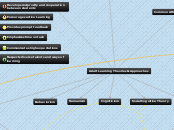Adult Learning Theories & Approaches
Behaviorism
Humanism
Cognitivism
Social Cognitive Theory
Leading Authors
Liv Vygotsky
Jerome Bruner
Jean Piaget
John Dewey
Bandura
Applied Instructional Methods
Group Case-Based Learning
Research Projects
Apprenticeships
Reflection Exercises
References
Clark, K. R. (2018). Learning Theories: Constructivism.
Samat, C., Chaijaroen, S. (2012). Design and development of constructivist multimedia learning environments to enhance computer skills for computer education learners. Procedia – Social and Behavioral Sciences, 46, 3000-3005.
Moll, L.C. (2001). Through the mediation of others: Vygotskian research on teaching. In V. Richardson (Ed.) Handbook of research on teaching (4th ed., pp. 111-129). Washington, DC: American Educational Research Association.
McCurdy, N., Naismith, L., Lajoie, S. (2010). Using metacognitive tools to scaffold medical students developing clinical reasoning skills. Cognitive and Metacognitive Educational Systems: Papers from the AAAI Fall symposium. 52-56.
Griffin, M. (1995). You can’t get there from here: Situated learning, transfer, and map skills. Contemporary Educational Psychology, 20, 65-87.
Strengths
Takes into Account Learner's Prior Knowledge
Empahizes Learner-Instructor Relationship
Learning Activities Are Generally Active
Learning Often Involves Social Interactions
Learning is Linked to Authentic Activities
Limitations
Emphasis on Groupwork may Disadvantage Less Dominant Learners
Many Consider Constructivism an Approach, not a Theory
Can be Labor Intensive and Time-Consuming for Instructors
Central Concepts
Situated Cognition
Discovery Learning
Experiential Learning
Self Reflection
Authentic Learning Environments
Educational Scaffolding
Zone of Proximal Development (ZPD)
Common Attributes of Adult Learners
Knowles Assumptions about adult learners
Adult self-concept moves towards self-direction
Adults use their experience as a resource for future learning
Readiness to learn is determined by social roles (need to know)
Adults are oriented towards immediate application leading to a problem-centered perspective
Adult learners are driven by Internal motivation
Adult learners need to know the relevance of subject material
Principles of Good Practice in Adult Education
Encourages contact between students and faculty
Develops reciprocity and cooperation between students
Encourages active Learning
Provides prompt feedback
Emphasizes time on task
Communicates high expectations
Respects diverse talents and ways of learning
My Personal Philosophy for Adult Education
Educational activities should be learner focused
Any educational endevour should start with a needs assessment which will guide learning objectives and instructional design
In general, learning activities should be active, engaging and occur in authentic learning environments
Adult learners are often capable of prioritizing their own learning needs, but a good instructor will provide objective feedback which can guide the learner's efforts
Learning is context specific - knowledge retention is enhanced when new learning is linked to immediate real-world applications
A Disorienting Dilema
Self-Examination
Critical Assessment of Assumptions
Recognition of One's Discontent & Sharing With Others
Exploration of Options for New Roles, Relationships and Actions
Planning a Course of Action
Acquiring Knowledge and Skills for Implementing Plans
Provisional Trying of New Roles
Building Competence and Self-Confidence in New Roles and Relationships
10. Reintegration into One's Life on the Basis of Conditions Dicated by One's New Perspective
Leading Authors
Jack Mezirow
Psychocritical
John Dirkx
Edward Taylor
Lenses for Understanding the Theory
Cognitive - Rational
"Beyond Rational"
Social Change
Applied Instructional Methods
Dialoge
Artistic Modes of Expression
Collaboration
Fieldwork
Simulation/AR/VR
Critical Reflection
References
Hamlin, M. (2015). Technology in transformative learning environments. In C. Halupa (Ed.), Transformative curriculum design in health sciences education (pp. 126-140). Hershey, PA: IGI Global.
Mezirow J (1991). Transformative dimensions of adult learning. San Francisco: Jossey-Bass.
Dirkx, J. M. (1998). Transformative learning theory in the practice of adult education: An overview. PAACE journal of lifelong learning, 7, 1-14.
Strengths
Usually Involves Active Participation
Activities are Engaging by their Nature
Learning Can be Powerful - Change in "How" the Learner Thinks Rather than Just "What" They Think
Limitations
Unclear What Actually "Transforms"
How "Permanent" is the Perspective Change?
Ethical Concerns about Methods and Application
Transformation can be Negative if the Experience is Uncontrolled


